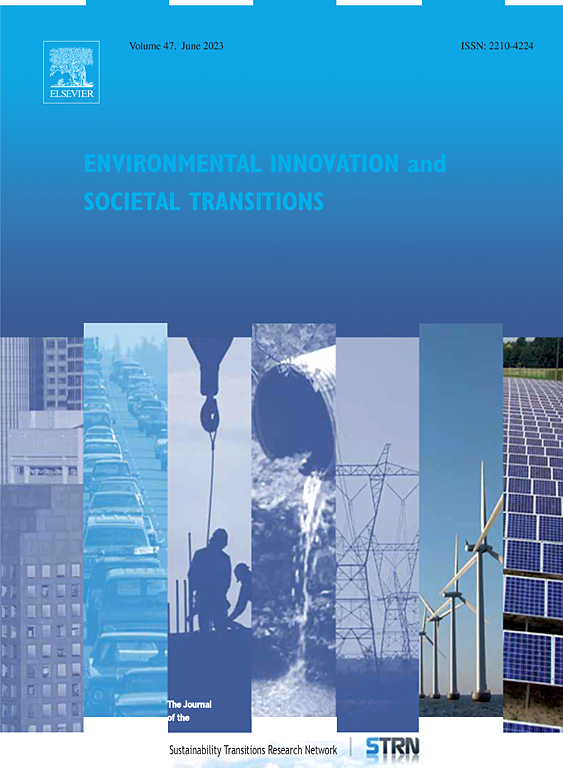Governing complexity: A comparative assessment of four governance models with applications to climate change mitigation and adaptation
IF 6.1
2区 经济学
Q1 ENVIRONMENTAL SCIENCES
Environmental Innovation and Societal Transitions
Pub Date : 2025-06-11
DOI:10.1016/j.eist.2025.101020
引用次数: 0
Abstract
Responses to ongoing global climate change include economy-wide mitigation efforts and large-scale societal adaptation that demand novel approaches to governance. An array of innovative governance models has been proposed since the late 1900s and early 2000s as scholars observed inadequacies of government-centric and formal legal approaches to natural resource management, complexity and uncertainty, failures of neoliberal economic reforms, and cross-scale institutional arrangements. Four such models have come to dominate the solution-oriented discourse on climate change governance: adaptive governance, transition governance, transformation governance, and anticipatory governance. We compare these models in terms of their origin and applicability to deal with the complexities of climate change. Our particular interest lies in how the four governance models propose to manage complexity and how they envision the role of governments as actors and law as an instrument in steering societal responses to climate change. Our analysis shows that while transition and transformation governance are often portrayed as more readily applicable to climate change mitigation, and adaptive and anticipatory governance to climate change adaptation, this sharp dichotomy does not hold water on closer scrutiny. Rather, all four governance models are applicable to different aspects of climate change mitigation and adaptation. Concerning complexity, all four governance models take some variation of social-ecological-technological complexity as their starting point. Finally on the role of government and law, adaptive governance, transition governance and one branch of transformation governance favour a facilitative role of governments, while another branch of transformation governance calls for a more involved and directive role for governments with heavy legal instrumentation and legal systemic change to match. Anticipatory governance plays more of a supporting role for implementing the other models and can range from facilitative to directive in that respect. With these observations, we hope to clarify the current global discussion over the perspectives offered by the four governance models in governing complexity in the context of climate change and beyond.
治理复杂性:对四种治理模式及其在减缓和适应气候变化方面的应用进行比较评估
对当前全球气候变化的应对包括全经济范围的缓解努力和大规模的社会适应,这需要采用新的治理方法。自20世纪末和21世纪初以来,学者们观察到以政府为中心和正式的法律方法在自然资源管理方面的不足、复杂性和不确定性、新自由主义经济改革的失败以及跨规模的制度安排,提出了一系列创新的治理模式。在以解决方案为导向的气候变化治理论述中,有四种模式占据主导地位:适应性治理、过渡治理、转型治理和预期治理。我们比较了这些模式的起源和适用性,以处理气候变化的复杂性。我们特别感兴趣的是,这四种治理模式如何提出管理复杂性的建议,以及它们如何设想政府作为行动者和法律作为指导社会应对气候变化的工具的作用。我们的分析表明,虽然过渡和转型治理通常被描述为更容易适用于气候变化缓解,而适应性和预见性治理则更容易适用于气候变化适应,但这种尖锐的二分法在更仔细的审查中是站不住脚的。相反,所有四种治理模式都适用于减缓和适应气候变化的不同方面。在复杂性方面,四种治理模式都以社会-生态-技术复杂性的某种变化为出发点。最后,在政府和法律的作用方面,适应性治理、过渡治理和转型治理的一个分支倾向于政府发挥促进作用,而转型治理的另一个分支则要求政府发挥更多的参与和指导作用,因为政府有大量的法律工具和法律制度变革来匹配。预期治理在实施其他模式方面更多地发挥支持作用,在这方面可以从促进到指导不等。通过这些观察,我们希望澄清当前关于气候变化及其他背景下治理复杂性的四种治理模式所提供的观点的全球讨论。
本文章由计算机程序翻译,如有差异,请以英文原文为准。
求助全文
约1分钟内获得全文
求助全文
来源期刊

Environmental Innovation and Societal Transitions
Energy-Renewable Energy, Sustainability and the Environment
CiteScore
13.60
自引率
19.40%
发文量
90
审稿时长
56 days
期刊介绍:
Environmental Innovation and Societal Transitions serves as a platform for reporting studies on innovations and socio-economic transitions aimed at fostering an environmentally sustainable economy, thereby addressing structural resource scarcity and environmental challenges, particularly those associated with fossil energy use and climate change. The journal focuses on various forms of innovation, including technological, organizational, economic, institutional, and political, as well as economy-wide and sectoral changes in areas such as energy, transport, agriculture, and water management. It endeavors to tackle complex questions concerning social, economic, behavioral-psychological, and political barriers and opportunities, along with their intricate interactions. With a multidisciplinary approach and methodological openness, the journal welcomes contributions from a wide array of disciplines within the social, environmental, and innovation sciences.
 求助内容:
求助内容: 应助结果提醒方式:
应助结果提醒方式:


